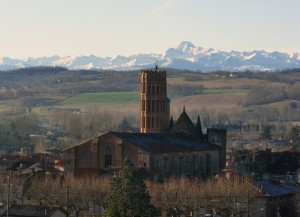When I read Nicholas Atkin’s fine article in the journal French History (March 1990) on the troubled relations between teachers and the church in Vichy France, I thought of an old friend, a retired instituteur, who might have personal reminiscences of that period, and when I contacted him I was not disappointed. This is not quite oral history, since he recorded his memories in a letter to me, but it certainly seems worthwhile sharing his personal recollections with others. I translate and summarise his account below.
Until his retirement a few years ago Louis Pédussaud was a teacher at Saint-Gaudens (Haute-Garonne) who had served his entire career, as is usual, in various schools in the département. He was a student at the école normale when war broke out, and during the phoney war his class gradually emptied as, one after another, his classmates were called up. As the youngest of his cohort he was the last to be mobilized. He vividly remembers Friday 10 May 1940: at 8am that morning, his history teacher – a woman standing in for the regular teacher who had been called up even though he had been wounded in World War One – arrived with a long face and told them that they would soon be in action. The boys were made to dig trenches to protect the local gunpowder factory; ironically, these defences, useless in 1940, were to assist the Germans who were deployed to counter allied air raids on the works in the spring of 1944.
Otherwise, M. Pédussaud saw no action, but witnessed instead the exodus of refugees from northern France. The armistice was a terrible shock – people had been confidently expecting a second victory of the Marne – and Petain’s coming to power was variously interpreted: for many, the hero of Verdun was their shield, the one Frenchman who could command the enemy’s respect; for others, he was their saviour, who would regenerate France after ‘years of decadence’; and for a few, he was suspected of being secretly hand-in-glove with Churchill and De Gaulle, and therefore of playing a clever waiting game.
A few days after the armistice, the Légion des Anciens Combatants was founded to serve as the shock troops of Petain’s Révolution Nationale. To mark the occasion, it was decided to light huge bonfires around the country. At Montesquieu-Volvestre (Haute-Garonne), M. Pédussaud’s home village, the inhabitants were expected to contribute a bundle of firewood; one per household was to be placed on the pavement. On the day of collection, M. Pédussaud was pleased to see that his house was one of the few on the street - possibly even the only one – not to put out a bundle. But when the cart appeared in the distance, Mme Pédussaud noticed that a record was being kept of those who had failed to contribute, and she pointed out to her son that as both he and his father were state employees, there was no knowing what might happen if they failed to toe the line. So she put out her bundle. ‘It was only a bundle of firewood’, M. Pédussaud comments, ‘but it was the first step on the road to enslavement’. The second step followed soon afterwards. On the first or second Sunday of July 1940, a memorial mass for those killed in the war was held at Montesquieu. His mother told him that, although not a practising catholic, his father, a World War One veteran, used to attend such masses as a mark of respect to his dead comrades. As his father had not yet been demobbed, Louis was prevailed upon to go instead. His compliance would have been even less willing had he known the theme of the sermon: that France’s defeat was all the fault of the ‘école sans Dieu’. He noted, however, that the local curé was careful not to inflame village feeling by delivering the sermon himself: instead, he got a refugee priest to give it. The homily was part of the propaganda offensive launched against the ‘lois scélerates’ which had separated Church and State in 1905. As Dr Atkins points out, the clergy had high hopes that Petain’s accession to power would lead to the repeal of those laws and to the end of secular education in France.
Read the second part of M. Pédussaud’s story here: A Teacher in Vichy France
Source: The French Historian, 5, 2 (December 1990), pp. 14-18, Revised by the author, 8 March 2013.
Comment on the story here.
